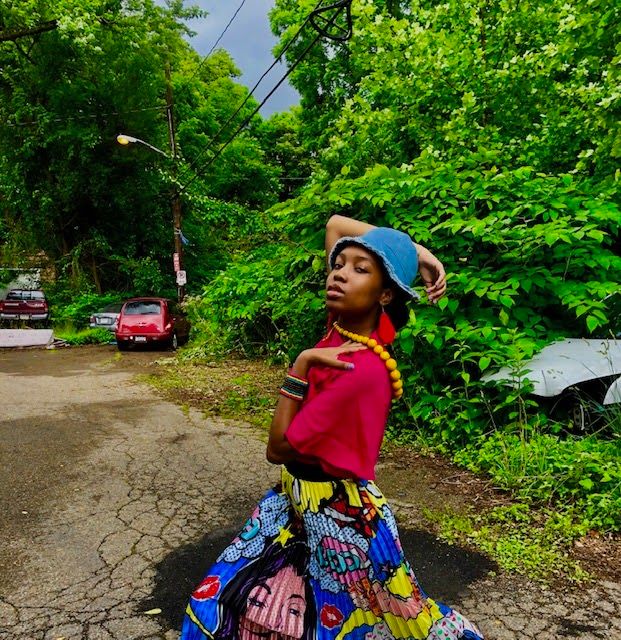When you think about fashion, you often think about clothes, trends, and style. But fashion is much more than that. It can be a means to exude confidence and create connection.
While fashion is a competitive industry, it can also be about giving back and making an impact. One of the most critical parts of the equation (and not often credited publicly) is the stylist. Stylists are charged with creating vision and bringing fashion to life, which means that passion and purpose are critical. Stylists are out here serving looks AND making a difference!
Meet Chi Ilochi, a 20 year old Nigerian American from Pittsburgh, PA. Chi is the founder of “StylingByChi,” a styling company that aims to heal, help, and inspire through style. Chi has styled for Fashion Gallery New York Fashion Week, Dress For Success, Goodwill of Southwestern Pennsylvania, and StyleWeek Pittsburgh.
StylingbyChi: Making fashion accessible
What makes Chi’s styling work unique is not only the how of styling but for whom. While Chi works with a variety of clients, working with the elderly, individuals living with autism, and at-risk youth is a substantial part of StylingbyChi. Chi discovered early on that defining your personal style can help you discover your voice, where it has otherwise been ignored, stifled, or misunderstood. It was this discovery, the realization that there was not an existing market for these clients, and Chi’s own intrinsic motivation to serve that inspired StylingbyChi.
We sat down with Chi to learn more about StylingbyChi, giving back, and the role that purpose, conviction, and authenticity play in the entrepreneurial journey. Catch gems from the conversation below!
When you created StylingbyChi, what were some of your early ambitions? Why was it important for you to start your own business versus working for someone else?
It was definitely to make it something where Black men and women can come to me and we can create jobs together. As a child, I’d look in magazines or red carpets and never really saw who the stylist was. More than getting a name out there, it was important for me to create a community as well. In early days, I would study celebrity and other established stylists but never hear the stories of how entryways were created for and up and coming stylists.
A journey shouldn't just be individual. As you grow and elevate your business, be sure that you create your space in some way. If you're passionate, you can help others. You have the ability to change the narrative.
There is a flow that emerges when you create your lane and leave room for others to follow.
How did you define your target audience and direction for your business?
In the beginning, I didn’t have a defined client or audience. I wanted to dress everybody, and I learned that with any business, you just can’t do that. What helped to narrow it down was considering aligning potential or ideal clients with my values, interests, and passion. This isn’t just my gift. There are people who don’t feel beautiful or confident. So it is important to focus not only on what you care about or what opportunities others can bring but focus on how you can form relationships and create impact.
As I learned more about the industry and different areas that can make me touch people that shaped my direction.
In your early days of business, what were some of your initial challenges? What lessons did you learn from them?
Life has a lot of unexpected turns that affect how I work. When I first got into StylingbyChi, I lost someone who strongly supported me and my vision. Shortly after, I lost two additional close friends. All to suicide. It was a very difficult time that taught me a lot, whether about how colors affect moods or about myself and how I navigate through tough times.
When you're pursuing a business or other kind of venture, it can be easy to get caught up in everything business-related. We forget life is still going to be life. My way of coping initially was to throw myself fully into StylingbyChi but that didn’t help. You can only run from your feelings and emotions for so long. I highly recommend therapy for any entrepreneur, any creative, whatever you do, go. Your mental health and wellbeing are just as necessary as any other part of your business.
Another lesson I learned is that, in the industry, not everyone will be how they portray themselves on social media. While there is community, there is lots of competition. Everyone is not like you and you’re not like everyone else and that’s fine but it does take getting used to that. You have to understand not only what you’re industry is like but who’s in it and learn how to compose yourself and respond.
What advice would you give yourself or other entrepreneurs starting out?

It’s okay. When you're starting the journey, you can get discouraged. You may not be feeling it some days and that’s okay. When God gives you a gift, it’s yours. He is not going to give you a gift and not guide you along the way. So I would say to anyone, trust the process. Don’t overthink. Take each day as it comes.
Sometimes we look at other people, especially on social media, and see all the accomplishments and accolades and you feel you’re losing this race. It is important to remember that you’re not racing against them, you're racing against yourself. And your 150 percent could be somebody else’s 70 percent and vice versa. You may have different timing, but you still have timing meant for you.
To anyone pursuing business or a creative career, trust the process and trust that your talent will make room for you. You don't have to overextend yourself. You don't have to do too much. Pace yourself. There will come a time where you look back on where you were and you may wish you would have enjoyed success as it comes.
What's for you is for you.
You have a unique approach, through partnerships with Goodwill, and your focus on the elderly, at-risk youth, and those living with mental illness. What led you to focus your client base in this way?

I started with what I didn’t see. I would never see how the styling industry was giving back unless it was for charity or a tax write-off. I never went into it as "let me style people who have less than me." It was placed in my spirit to create an opportunity to make someone who doesn't always receive attention or have someone asking how their day is, feel good. I wanted to change the narrative of being a stylist. Yes, I can work with other clients and models. But the best part about what I do is being able to help someone who no one really thinks about—that surpasses everything.
Working children with autism is special for me. Before a styling session, I do research and look at colors and sensory. It’s never about this turtleneck or a particular piece but more how does the fabric feel, is it comfortable, and how do the colors make you feel. A lot of children I style with autism are nonverbal. So communication might be if you can react, give a thumbs up or thumbs down, or reading body language to determine comfort level.
For my elderly clients, it’s a different process and actually very easy. They trust my judgment and want pieces that make them feel comfortable and look good. Many times, I get to freestyle with it.
Regardless of your business, knowing your audience and respecting their needs is a must.
How has the current state of the world (COVID-19 and racial justice movement) impacted your work with clients? Your own approach to business? How do you stay inspired in the face of these challenges?
It's definitely put a great deal of things on hold. I had fashion shows and other styling work lined up that are now on pause. At the same time, I was able to start my own magazine that featured other Black stylists during this process. In that, I was able to uplift myself and other people. The magazine wasn’t a thought I had previously. I always thought about how so many stylists try to get placements in magazines, so why not do my own? It was a random thought but one that I’m glad I could act on. It turned into something by accident yet on purpose.
Adapting to this COVID era, I've been styling and consulting virtually. As with an change, I'm learning as I go. Right now, it's just heavy with the state of the world. Trying to navigate that has been a little challenging because you go on social media and there's no pause. What keeps me inspired is trying to meditate, journal, walk, jog, bike, and learning when to take a break from styling. Insecure has also helped. Overall, it hasn’t fully stopped things—just forced me to be more strategic about how I do it.
What makes you a Mogul Millennial?

I first found Mogul Millennial when I needed inspiration. So when I read articles and other stories, I felt encouraged that I can do this. If they can keep pushing, I can too.
What makes me a Mogul Millennial is pursuing a career with nobody else doing it. There is no history of this path in my personal life. My family members are engineers, lawyers, nurses, marketers. Navigating something where you are the artist of the family with no guiding experience is truly making something out of nothing. I made it by believing in myself, wanting and seeing more for myself, and wanting to help other people.
Being able to create a platform for those that look like and doing so at a young age? I feel that makes me a Mogul Millennial.
We couldn’t agree more, Chi. To learn more about Chi’s amazing story, check out StylingbyChi online and on Instagram!

